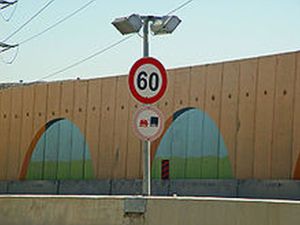“We will shield ourselves from the mentality that walling ourselves off from trouble somehow solves the problem.”
 Tel Aviv, October 22 – Perturbed that many people who accept separation barriers as a valid approach to address problems enter Tel Aviv each day, the city council today adopted a measure that will fund the construction of a wall along the city’s municipal boundaries to keep them out.
Tel Aviv, October 22 – Perturbed that many people who accept separation barriers as a valid approach to address problems enter Tel Aviv each day, the city council today adopted a measure that will fund the construction of a wall along the city’s municipal boundaries to keep them out.
The measure, which passed by a vote of 19-10,calls for budget allocations to fund a barrier along the borders with Ramat Hasharon, Bnei Brak, Ramat Gan, Holon, Bat-Yam, and other adjacent cities, with the aim of protecting residents and commuters from other Israelis who believe walls to keep out dangerous individuals are a legitimate move.
Israel suffered under a wave of Palestinian bombing and shooting attacks in the early part of the previous decade, a “Second Intifada” that killed thousands. In response the Israeli government began construction on a barrier to separate the country’s heartland from major Palestinian population centers from which the attacks originated. Left-wing opponents of the separation barrier – which in places is a concrete wall, and in places a mere barbed-wire fence – accused the Ariel Sharon’s Likud government at the time of implementing Apartheid-like policy through the construction of the barrier, which they said unjustly and collectively punished the entire Palestinian population by restricting their access to employment, health care, and other services beyond the wall or fence. The project nevertheless proceeded, despite constant demonstrations by Palestinians and left-wing Israelis, and suicide bombings were almost eliminated in the ensuing years.
Nevertheless, Tel Aviv remains a stronghold of leftist politics – Meretz controls five seats on the city council, the largest delegation of any party – and opposition to such barriers remains high despite the manifest effectiveness in saving lives and providing greater security. “The ends do not justify the means,” said Tzvi Oot, a Meretz spokesman. “Creating a large ghetto – regardless of which side of the wall is the reference – is an undemocratic, heavy-handed measure that in the long run only creates more problems.”
“That is why we in Tel Aviv will now act to prevent such thinking from infecting our municipality by erecting a wall. We will shield ourselves from the mentality that walling ourselves off from trouble somehow solves the problem, that we can treat the symptom of the problem and then pretend the problem itself no longer threatens us,” he continued.
Mayor Ron Huldai abstained on the vote, but promised that the city’s budget could accommodate the project by redistributing resources that had been earmarked for other municipal projects. “Traffic in this city was already troublesome before we started the light rail a couple of months ago,” he explained. “There is no reason that has to be the only project snarling traffic up in Tel Aviv. So we’re revising next year’s budget to slow the pace of light rail development and instead investing in this barrier, which will help us maintain our precious openness.”




